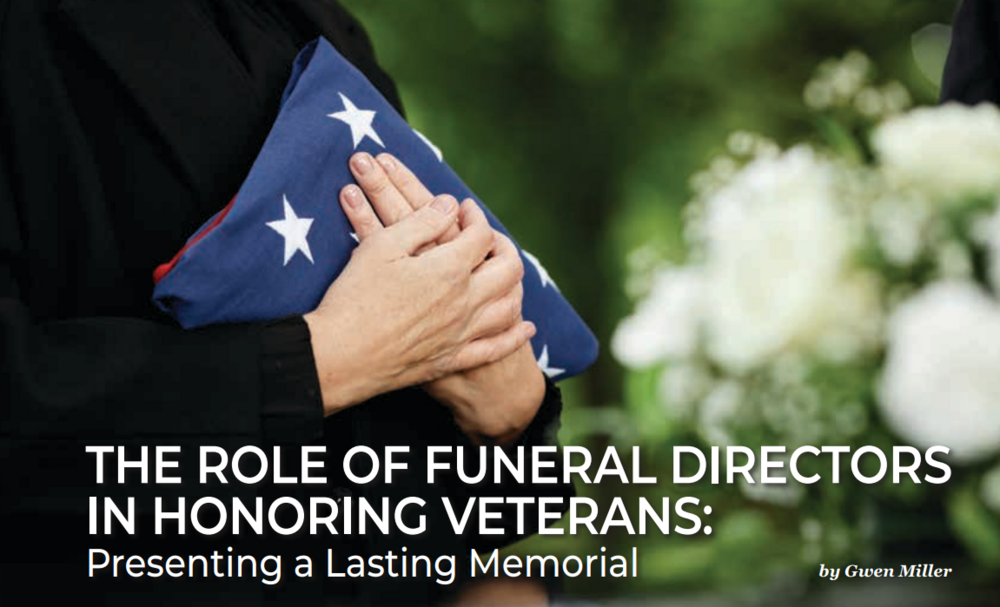(404) 312-6640
THE ROLE OF FUNERAL DIRECTORS IN HONORING VETERANS: Presenting a Lasting Memorial
Bereavement, which literally means “to be deprived by death,” and grieving, the outward expression of this loss, are deeply personal and often overwhelming experiences¹. When planning a funeral for a veteran, the process goes beyond mere logistics and tradition. It requires a deep understanding of both psychology and economics to truly honor the individual and support the grieving family. The emotional weight of losing a loved one, particularly someone who has served their country, demands a sensitive approach that respects the family’s grief while addressing their financial concerns. Balancing these emotional and economic factors is crucial in funeral planning, influencing decisions from the selection of services to the creation of a lasting memorial.
One of the most meaningful ways to preserve a Veteran’s memory is through a lasting tribute that honors their service and sacrifice: a flag case. The triangular-shaped American flag, presented to the family on behalf of a grateful nation, carries deep historical significance and symbolism. The tradition of folding the flag into a triangle dates back to the War of 1812 and is designed to represent the tricorn hats worn by soldiers during the American Revolution, symbolizing the military’s honorable service and the principles of freedom they defended ². This simple yet powerful symbol serves not only as a remembrance of the Veteran’s service but also as a source of comfort for the family. The presentation of this memorial must be handled with care, ensuring it resonates with the family on both an emotional and practical level. By thoughtfully integrating psychological support with an awareness of financial realities, funeral directors can help families create a memorial that honors their loved one’s legacy in a way that is both heartfelt and sustainable.
When I started at the University of North Carolina in 2013, my first Economics professor defined economics simply as “the social science of decision-making.” In the context of funerals, this means making thoughtful decisions about how to honor a loved one within the usual constraints: financial, emotional, and societal resources. Understanding grief and its implications is key to this process. As someone with a background in economics and marketing, I wanted to explore the differences between “grief” and “grieving” more deeply. To do this, I consulted my sister, Brandi Geddings, M.A., LCMHC, who specializes in trauma and traumatic loss. She highlighted a great article by Berly McCoy, where Mary-Frances O’Connor, a psychology professor at the University of Arizona, explains that grief is the emotional state that can overwhelm you, like a wave, while grieving involves the ongoing process of adapting to life without the loved one ³. O’Connor notes that grief affects the brain in profound ways, often leading people to feel as though they’ve lost a part of themselves. This is where funeral directors play a critical role.
When planning a funeral for a veteran, funeral directors are essential in guiding families through the emotional, financial, and societal challenges that arise. Veterans, who have served their country with honor, deserve a funeral that reflects their service and a memorial that provides lasting comfort to their families. One of the most significant and honorable tributes a family can receive is a flag case, which encapsulates the Veteran’s dedication and the nation’s gratitude.
ALLEVIATING FINANCIAL CONSTRAINTS
Funeral planning can be financially challenging, especially with unexpected costs. Funeral directors can help families manage these expenses through:
• TRANSPARENT PRICING & BUNDLED PACKAGES: Provide clear, itemized pricing to help families make in formed decisions without hidden costs. Offer a range of options to fit various budgets while honoring their loved ones. You can also create packages that include essential services, such as the flag presentation ceremony, military honors, and a custom flag case, at a reduced rate to simplify planning and save costs.
• FLEXIBLE PAYMENT PLANS: Offer payment plans or financing options to spread the cost over time, easing the immediate financial burden. If possible, BNPL (“Buy Now, Pay Later”) can be utilized as we see these financing options outpacing other financing.
• ASSISTANCE WITH BENEFITS: Help families navigate benefits such as veterans’ burial allowances or Social Security death benefits. Organizations like the Veterans of Foreign Wars (VFW) or the American Legion can provide additional support and resources.
• PRE-PLANNING SERVICES: Encourage pre-planning to lock in current prices and reduce future costs, allowing veterans to ensure their service is honored according to their wishes.
ADDRESSING EMOTIONAL NEEDS
The emotional impact of losing a veteran is profound. Funeral directors can support families through:
• GRIEF COUNSELING AND SUPPORT: Connect families with grief counseling services, either in-house or through local organizations like Hospice Foundation of America, to help them navigate their grief.
• PERSONALIZED SERVICES: Offer funeral options that reflect the Veteran’s life and values, such as custom tribute videos or memory tables, to create a meaningful and personalized service.
• GUIDANCE AND PLANNING ASSISTANCE: Provide compassionate guidance to help families make decisions that honor their loved one’s legacy while respecting their emotional and cultural needs.
NAVIGATING SOCIETAL EXPECTATIONS
Funeral directors can assist families in managing societal and cultural expectations by:
• CULTURALLY SENSITIVE SERVICES: Ensure services are culturally and religiously appropriate to respect family traditions.
• COMMUNITY ENGAGEMENT: Facilitate community support through memorial events or virtual services, such as motorcade processions or veteran-themed celebrations.
• EDUCATIONAL RESOURCES: Provide materials about the funeral process and societal pressures, empowering families to make informed decisions. Families may feel the need to maintain a composed and stoic demeanor during the funeral, as veterans are often associated with strength and resilience, making it challenging to openly express grief.
PRESENTING A LASTING MEMORIAL: THE FLAG CASE
The presentation of a flag case is one of the most poignant moments in a Veteran’s funeral, embodying the nation’s deep gratitude for their service. When my grandfather passed away in June 2019, our family was devastated and overwhelmed. Fortunately, our local funeral home, which has supported our family through difficult times for decades, was there to assist us once again. While we had a beautiful reception and a full funeral with military honors, the moment that still resonates with me was the flag folding and presentation. My grandmother and father were not prepared to accept the flag, so before the service, the funeral home staff sat down with us to carefully plan the logistics, ensuring that I would receive the flag seamlessly and respectfully. They even arranged for the folded flag to be displayed for viewing, allowing us to honor it without having to physically hold it during the ceremony—a task that turned out to be more emotionally challenging than I had anticipated. To ensure this moment is both honorable and comforting, funeral directors can take several thoughtful steps:
• MILITARY HONORS CEREMONY: Coordinate a military honors ceremony where the flag is presented with the utmost respect. This ceremony, often accompanied by the playing of “Taps” and a rifle salute, is a deeply moving gesture that reinforces the significance of the flag as a memorial.
• PERSONALIZED FLAG CASES: Offering customized flag cases, perhaps engraved with the Veteran’s Military branch or photo, name, rank, and service dates, provides a lasting tribute that the family can cherish. The flag case should be presented with a brief explanation of its significance, further connecting the family to their loved one’s legacy.
• INCLUSIVE PRESENTATION: Involve family members in the flag presentation, perhaps by having a close relative participate in the ceremony or by allowing the family to choose a location for displaying the flag case in their home.
• COMMEMORATIVE GATHERINGS: After the presentation, consider organizing a gathering where family and friends can reflect on the Veteran’s service. This could include sharing stories, displaying military memorabilia, and creating a space for communal remembrance.
I always strive to offer information that is both relevant and essential to understanding the emotional and psychological toll that funeral directors endure, recognizing the crucial role they play in our society. Funeral directors provide invaluable emotional and economic support to families during the overwhelming process of burying a loved one, especially when that loved one was a veteran or first responder. These professionals guide families through complex and often lengthy procedures, helping to alleviate the financial strain by offering transparent pricing, bundled service packages, and assistance with securing benefits. On an emotional level, they offer grief support, personalized services, and compassionate guidance, bringing comfort to families in their time of need. However, this close involvement with grieving families, especially those who have lost a veteran or first responder, can lead funeral directors to internalize the residual feelings of trauma. This emotional burden, accumulated over time, can result in vicarious trauma, also known as secondary trauma. Vicarious trauma occurs when individuals are exposed to the traumatic experiences of others, leading to emotional and psychological stress similar to that of direct victims. In the funeral profession, directors often work closely with grieving families, particularly those of veterans and first responders, who have endured significant loss and trauma. This repeated exposure to grief and tragedy can take a toll on funeral directors, manifesting as compassion fatigue, burnout, or even symptoms akin to post-traumatic stress disorder (PTSD). Just as first responders need support to process their experiences, funeral directors must also address their own emotional well-being. Strategies for managing vicarious trauma include seeking peer support, engaging in regular counseling or therapy, and practicing self-care techniques such as mindfulness and stress management. Additionally, creating a supportive work environment where staff can openly discuss their feelings and experiences can help mitigate the effects of secondary trauma. By recognizing and addressing vicarious trauma, funeral directors can continue to provide compassionate care to families while maintaining their own mental and emotional health.






Comments